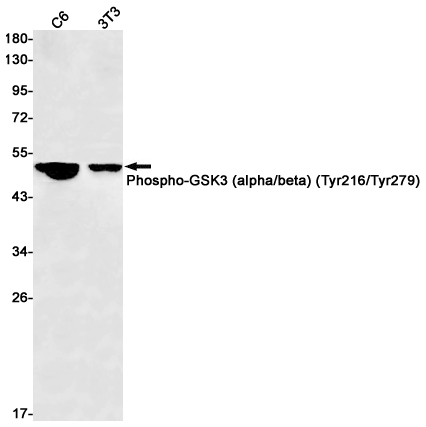
| WB | 咨询技术 | Mouse,Rat |
| IF | 1/20 | Mouse,Rat |
| IHC | 咨询技术 | Mouse,Rat |
| ICC | 技术咨询 | Mouse,Rat |
| FCM | 咨询技术 | Mouse,Rat |
| Elisa | 咨询技术 | Mouse,Rat |
| Aliases | Serine/threonine-protein kinase GSK3A; Serine/threonine-protein kinase GSK3B |
| Entrez GeneID | 2931/2932 |
| WB Predicted band size | Calculated MW: 51 kDa; Observed MW: 47-51 kDa |
| Host/Isotype | Rabbit IgG |
| Antibody Type | Primary antibody |
| Storage | Store at 4°C short term. Aliquot and store at -20°C long term. Avoid freeze/thaw cycles. |
| Species Reactivity | Mouse,Rat |
| Immunogen | A synthetic phosphopeptide corresponding to residues surrounding Tyr216 of human GSK3 alpha |
| Formulation | Purified antibody in TBS with 0.05% sodium azide,0.05%BSA and 50% glycerol. |
+ +
以下是关于 **Phospho-GSK3 (Tyr216/Tyr279)** 抗体的3篇参考文献及其摘要内容:
---
1. **文献名称**:*Crystal Structure of Glycogen Synthase Kinase 3β: Structural Basis for Phosphate-Primed Substrate Specificity and Auto-Inhibition*
**作者**:Dajani, R. et al.
**摘要**:该研究解析了GSK3β的晶体结构,揭示了Tyr216磷酸化对其激酶活性的重要性,并表明该位点的磷酸化可能通过调控底物结合位点增强GSK3β的催化活性。
2. **文献名称**:*Regulation of Glycogen Synthase Kinase-3 by Tyrosine Phosphorylation*
**作者**:Hughes, K. et al.
**摘要**:文章探讨了GSK3α(Tyr279)和GSK3β(Tyr216)的酪氨酸磷酸化对其活性的调控机制,提出磷酸化可能通过构象变化促进激酶活性,并验证了针对该位点的抗体在检测内源性磷酸化信号中的应用。
3. **文献名称**:*GSK-3: Tricks of the Trade for a Multi-Tasking Kinase*
**作者**:Frame, S. and Cohen, P.
**摘要**:综述总结了GSK3的多种功能及其调控机制,强调Tyr216/Tyr279磷酸化是激活GSK3的关键事件,并讨论了相关抗体在信号通路研究(如Wnt/β-catenin)中的应用。
4. **文献名称**:*Regulation of Wnt Signaling by Differential Phosphorylation of GSK3β*
**作者**:Bhat, R.V. et al.
**摘要**:研究揭示了GSK3β Tyr216磷酸化在Wnt信号通路中的核心作用,表明该磷酸化事件通过增强激酶活性调控β-catenin降解,并利用特异性抗体验证了磷酸化水平与疾病模型的关联。
---
以上文献均涉及Phospho-GSK3 (Tyr216/Tyr279)抗体的应用或相关磷酸化位点的功能机制,涵盖结构生物学、信号通路及疾病模型研究。
The Phospho-GSK3 (Tyr216/Tyr279) antibody detects glycogen synthase kinase-3 (GSK3) when phosphorylated at specific tyrosine residues critical for its activity. GSK3 exists as two isoforms, GSK3α and GSK3β, which play central roles in cellular signaling pathways, including Wnt, insulin, and growth factor signaling. Unlike its inhibitory phosphorylation at serine residues (Ser21 in GSK3α and Ser9 in GSK3β), tyrosine phosphorylation at Tyr216 (GSK3β) and Tyr279 (GSK3α) enhances kinase activity. These residues reside in the activation loop of the kinase domain, and their phosphorylation stabilizes the active conformation, promoting substrate binding and enzymatic function.
This phosphorylation event is thought to occur via autophosphorylation during GSK3 maturation or through upstream kinases, though regulatory mechanisms remain less defined compared to serine phosphorylation. The Phospho-GSK3 (Tyr216/Tyr279) antibody is widely used in research to study GSK3 activation dynamics in conditions such as metabolic disorders, neurodegenerative diseases (e.g., Alzheimer’s, where GSK3β hyperactivation contributes to tau hyperphosphorylation), and cancer. It is applied in techniques like Western blotting, immunofluorescence, and immunoprecipitation to assess GSK3 activity in response to stimuli or therapeutic interventions. Understanding GSK3 regulation via tyrosine phosphorylation provides insights into its dual roles as a tumor suppressor or promoter, depending on context, and informs drug development targeting GSK3 dysregulation.
×